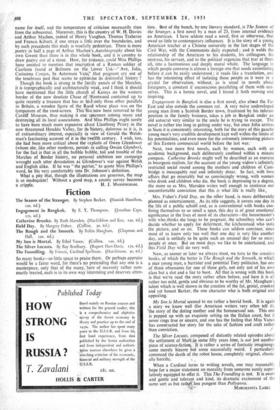Fiction
My Son is Mortal. By Ethel Vance. (Collins. los. 6d.) So many books—so little space to praise them. Or perhaps appraise would be a fairer word, for there's no pretending that any one is a masterpiece, only that of the many,- here of necessity rather sum- marily treated, each is in its own way interesting and deserves atten- tion. Best of the bunch, by-any literary standard, is The Season of the Stranger, a first novel by a man of 23, from internal evidence an American. I have seldom read a novel, first or otherwise, that owed so little to contemporary influences. It is the story of a young American teacher at a Chinese university in the last stages of the Civil War, with the Communists daily expected ; and. it welds the relationship of the American to his students, his colleagues, his mistress, his servant, and to the political urgencies that tear at them all, into a harmonious and deeply moral whole. The language in which people converse is almost a foreign one that needs assimilating before it can be easily understood ; it reads like a translation, and has the interesting effect of isolating these people as it were in a crystal for observation, without.- as is usual in novels about foreigners, a constant if unconscious paralleling of them with our- selves. This is a heroic novel. and I found it both moving and inspiring.
Engagement in Bangkok is also a first novel, also about the Far East and also outside the common rut. A very naive undeveloped young man from a Scottish Border town, frustrated by his inferior position in the family business, takes a job in Bangkok under an old autocrat very similar to the uncle he is trying to escape. The novel is rather too long in getting under way, but once John arrives in Siam it is consistently interesting, both for the story of this gauche young man's very credible development kept well within the limits of his potentialities, and.even more for the extremely interesting picture of this Eastern commercial world before the last war.— Next, two more first novels, each by women, each with an academic background, each deliberately confined within a minute compass. Catherine Brooke might well be described as nn exercise in bourgeois realism, for the account of the young widow's infinitely restricted social round among the mothers and children of Cam- bridge is inescapably real and infinitely drear. In fact, with love affairs that go miserably but so convincingly wrong, with women who drink and children who die, the book is depressing to a degree, the more so as Mrs. Marsden writes well enough to reinforce our uncomfortable conviction that this is what life is really like./
Mrs. Fisher's Field Day, on the other hand, is more deliberately planned as entertainment. As its title suggests, it covers one day in the life of a public schat and, as is conventional with books con- fining themselves to so small a span, this day is of great emotional significance in the lives of most of its characters—the housemaster's wife who ,thinks she longs to be pregnant, the schoolboy who can't decide whether to apply for deferment, the kitchenmaid who stole the picture, and so on. These books can seldom convince, since most of us know only too well that one day is very like another day, and is unlikely to be quite such an unusual day for so many people at once. But on most days we like to be entertained, and this Field Day will do very well.
Now, as sooner or later we always must, we turn to the sensitive books, of which the better is The Rough and the Smooth, in which a nice young man, a barrister and potential Tory politician, has one of those obsessions for one of those girls, not only not of his own class but a slut and a liar to boot. All that is wrong with this book is that we've read the story rather often before, and here it is all rather too mild, gentle and obvious to be worthy of Mr. Maugham's talent which is well shown in the creation of the fat, genial, crooked and yet honest Barker, the one character who is both original and appealing.
- My Son is Mortal seemed to me rather a horrid book. It is again a story we know well (for American writers very often tell it), the story of the doting mother and the homosexual son. This one is pepped up with an exquisite setting on the Italian coast, but it never rings true or sincere, and one has the feeling that Miss Vance has constructed her story for the sake of fashion and craft rather than conviction.
The Silver Locusts, composed of distantly related episodes about the settlement of Ma6,in some fifty years time, is not just another piece of science-fiction It is rather a series of fantastic imaginings. some merely bizarre but some successfully weird. I particularly commend the death of the robot house, completely original, classic- ally horrific.
When a Cardinal turns to writing novels, one may reasonably hope for a major statement on morality from someone surely super- latively equipped to offer it. This The Foundling is not. It is sweet and gentle and tolerant and kind, its dramatic excitement of the same sort as but ratl. less pungent than Pollyanna.
• MARGHANITA LASKI.


































 Previous page
Previous page